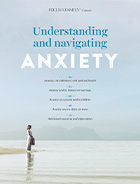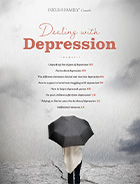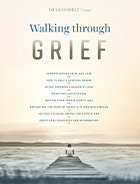
In this first video, author Debra Fileta talks about emotional health. As a counsellor, she’s talked to many men and women who struggle with emotional and mental health despite being spiritually mature. Debra herself understands that struggle, and she shares her experiences with depression, anxiety, trauma and panic attacks. Watch the video to get started. Then check out the discussion questions, Scripture verse, prayer and additional resources.
After watching video 1, consider taking these steps to get the most out of this part of the series:
// Step 1
Answer these discussion questions:
// Step 2
Read and meditate on these verses: “For I am sure that neither death nor life, nor angels nor rulers, nor things present nor things to come, nor powers, nor height nor depth, nor anything else in all creation, will be able to separate us from the love of God in Christ Jesus our Lord.” (Romans 8:38-39)
// Step 3
Spend time in prayer:
God,
You know what I’m struggling with, even if I don’t always show it to others.
Thank you for loving me and caring for me, even when I feel like I don’t deserve it.
When I’m feeling hopeless, please remind me of that love, and give me wisdom and comfort as I walk this difficult journey.
Amen.
// Step 4
 Download our free booklet Understanding and Navigating Anxiety. In this PDF, you’ll find professional advice, biblical insights and follow-up resource suggestions to help you better understand and navigate anxiety in your own life, in your marriage, as a parent and specifically with your teens.
Download our free booklet Understanding and Navigating Anxiety. In this PDF, you’ll find professional advice, biblical insights and follow-up resource suggestions to help you better understand and navigate anxiety in your own life, in your marriage, as a parent and specifically with your teens.
// Step 5
 Get your copy of Debra Fileta’s book Are You Really OK? Fileta challenges you to get real with who you are and how you’re doing spiritually, emotionally, mentally and physically so you can recognize where you need growth and healing. Order your copy of this book today and get $4 off when you use the code*: NOTOKAY
Get your copy of Debra Fileta’s book Are You Really OK? Fileta challenges you to get real with who you are and how you’re doing spiritually, emotionally, mentally and physically so you can recognize where you need growth and healing. Order your copy of this book today and get $4 off when you use the code*: NOTOKAY

In the second video, Debra Fileta talks about delayed responses to trauma, as well as harmful beliefs Christians can have about mental and emotional health. God commands us to love him with all our heart, soul, mind and strength, so we need to be prepared for the enemy to attack those areas. We also need to remember that struggling with emotional and mental health doesn’t make us less-than, and that we shouldn’t be ashamed to ask for help and support.
After watching video 2, consider taking these steps to get the most out of this part of the series:
// Step 1
Answer these discussion questions:
// Step 2
Read and meditate on this verse: “And He said to him, ‘You shall love the Lord your God
with all your heart and with all your soul and with all your mind.’” (Matthew 22:37)
// Step 3
Spend time in prayer:
Dear Lord,
In your time on earth, you learned what it’s like to suffer.
You understand the wounds from my past, and you understand what I’m going through.
Please help me as I work through these hardships.
Help me find people I can lean on, help me find what I need to heal, and help me remember that my struggles don’t diminish your love for me.
Amen.
// Step 4
Listen to the Focus on the Family Broadcast “Finding Hope Again” with Kay Warren as she talks openly about how childhood trauma and/or mental illness can make people – Christians included – susceptible to depression and even suicidal thoughts.
// Step 5
Read the article “How to get past the past” by Wendy Kittlitz. When things in our past remain unresolved, they go with us from relationship to relationship, from church to church, and often we don’t even realize that they’re there. These four steps are a good place to start.

In this third video, Debra Fileta discusses emotions we keep to ourselves, and the way they can explode if left to fester. In order to heal, we need to acknowledge our feelings, develop empathy and have a proper view of God.
After watching video 3, consider taking these steps to get the most out of this part of the series:
// Step 1
Answer these discussion questions:
// Step 2
Read and meditate on this verse: “This God – his way is perfect; the word of the Lord proves true; he is a shield for all those who take refuge in him.” (2 Samuel 22:31)
// Step 3
Spend time in prayer:
Father,
Forgive me for all the times I’ve let my emotions get the best of me.
As I examine old wounds and powerful emotions, help me have the strength and patience to heal. And most of all, help me have a proper view of you.
Remind me of your kindness, generosity and love, and let that influence how I act and think.
Amen.
// Step 4
Listen to the Focus on the Family Broadcast “Controlling Anger So It Doesn’t Control You” with Dr. Gary Chapman. Do you see anger continually your life? Dr. Chapman offers practical advice for dealing with anger in a healthy manner and embracing the power of forgiveness.
// Step 5
Read the article “What forgiveness is not: 5 common misconceptions” to understand how to step out of the cycle of bitterness and revenge. A number of resources explain what forgiveness is, but there is little that helps a person understand what it is not – and that is often the key.

In the fourth video, Debra Fileta talks about how people feel the need to do it all. However, this mindset can actually make us unable to pour into others. She also discusses flawed patterns of thinking and how to combat them.
After watching video 4, consider taking these steps to get the most out of this part of the series:
// Step 1
Answer these discussion questions:
// Step 2
Read and meditate on this verse: “Come to me, all who labour and are heavy laden, and I will give you rest.” (Matthew 11:28)
// Step 3
Spend time in prayer:
God,
I often struggle with everything I need to do in my life.
Please give me the strength to do what I can, the humility to ask for help and the peace to accept when I can’t do it all.
Remind me that you are in control, and that I don’t have to be everything to everyone.
Please also help me recognize and challenge my flawed patterns of thinking, and to replace those negative thoughts with your truth.
Thank you for being a loving father who gives us strength and comfort.
Amen.
// Step 4
Read the article “Healthy individuals create healthy marriages” by Jill Savage. Because the health of marriage is ultimately determined by individual health, we need to be diligent about our own emotional, mental, physical and spiritual fitness.
// Step 5
Read the article “7 ways to improve mental health within your family” by Dr. Patricia Landry. Discovering how to improve mental health is a family affair. Here are seven ways to improve mental health within your family so that you can better handle any of life’s curveballs.

In this fifth video, Debra Fileta talks about mental health stigmas that affect believers who struggle with mental and emotional health. Although many see these issues as a sign that a person lacks faith, it is often actually the catalyst that can draw someone closer to God.
After watching video 5, consider taking these steps to get the most out of this part of the series:
// Step 1
Answer these discussion questions:
// Step 2
Read and meditate on this verse: “But they who wait for the Lord shall renew their strength; they shall mount up with wings like eagles; they shall run and not be weary; they shall walk and not faint.” (Isaiah 40:31)
// Step 3
Spend time in prayer:
Lord,
I want my struggles to draw me closer to you.
Help me fight the lies that my mind brings to me, and instead let me absorb your truth.
Though some would say I lack faith, help my faith to grow even stronger through these trials.
Remind me to reach out to you in my suffering, and use these hardships to strengthen my walk with you.
Amen.
// Step 4
Read the article “Bursting negative thought bubbles” by Danny Huerta. When emotion is involved or we are experiencing stress, insecurity and fear, researchers have identified how our thinking can mislead us to believe that certain things are true. Here are a few ways that our thoughts can mislead us.
// Step 5
 Download our free booklet Dealing with Depression. In this PDF, you will learn the factors that can lead to both clinical and reactive depression, symptoms to watch for in yourself and those around you, how to help a loved one, spouse and/or child who may be struggling, and how we can look to God even in our darkest valleys.
Download our free booklet Dealing with Depression. In this PDF, you will learn the factors that can lead to both clinical and reactive depression, symptoms to watch for in yourself and those around you, how to help a loved one, spouse and/or child who may be struggling, and how we can look to God even in our darkest valleys.

In video 6, Debra Fileta discusses the process of healing from trauma. Although we often hope it will happen immediately, the best healing comes when we allow ourselves to process trauma slowly and deliberately.
After watching video 6, consider taking these steps to get the most out of this part of the series:
// Step 1
Answer these discussion questions:
// Step 2
Read and meditate on this verse: “I have said these things to you, that in me you may have peace. In the world you will have tribulation. But take heart; I have overcome the world.” (John 16:33)
// Step 3
Spend time in prayer:
God,
Thank you for how you’ve designed us to heal, allowing us to survive first and process our wounds later.
You know the wounds I have in my past, you know my current pain, and you know how I’m going to recover.
Father, please show me what you’re healing in me right now.
Guide me through this layer of healing and show me what you want me to do.
As I go through this process, help me grow closer to you and your will for my life.
Amen.
// Step 4
Listen to the Focus on the Family Broadcast “Grieving, Healing and Hoping After Miscarriage” with Adriel Booker. Having miscarried four times, she talks openly about how her faith has sustained and comforted her through the pain, and offers encouragement to families walking a similar path of grief.
// Step 5
Read the article “Psychological trauma: What was intended for evil God can use for good.” Your child’s life may not be going the way they want it to or something horrible and tragic may have occurred. Let them know God is the author of great comebacks. He has an awesome one specially designed for them!

In this final video, Debra Fileta talks about what happens when we feel mostly healed from our past. Although we feel fine, pain can linger, but it’s that same lingering pain that reminds us of our need for God.
After watching video 7, consider taking these steps to get the most out of this part of the series:
// Step 1
Answer these discussion questions:
// Step 2
Read and meditate on these verses: “But he said to me, ‘My grace is sufficient for you, for my power is made perfect in weakness.’ Therefore, I will boast all the more gladly of my weaknesses, so that the power of Christ may rest upon me. For the sake of Christ, then, I am content with weaknesses, insults, hardships, persecutions, and calamities. For when I am weak, then I am strong.’” (2 Corinthians 12:9-10)
// Step 3
Spend time in prayer:
Dear Father,
It’s hard to see suffering as something you can use for good.
But you use it to draw us closer to you, to remind us that we need you and even to help others with hardships like ours.
When I’m struggling, help me face it instead of ignoring it or feeling like I’ve fallen back.
Help me see hardship as a chance to lean on you more.
Amen.
// Step 4
Listen to the Focus on the Family Broadcast “What to Do When Tragedy Impacts Your Family” with grief and trauma counsellor Dr. H. Norman Wright as he offers hope and practical advice for enduring suffering, crisis and loss, and finding healing afterward.
// Step 5
 Download our free booklet Walking Through Grief. There is no set timeline and no one way to grieve, and this open-ended process can feel daunting for many. But there are many God-given tools we can use to process loss well. In this PDF, you’ll find articles and resource suggestions filled with biblically based and psychologically sound advice for walking through grief in a healthy way.
Download our free booklet Walking Through Grief. There is no set timeline and no one way to grieve, and this open-ended process can feel daunting for many. But there are many God-given tools we can use to process loss well. In this PDF, you’ll find articles and resource suggestions filled with biblically based and psychologically sound advice for walking through grief in a healthy way.
Need more help?
Reach out to our counsellors if you need help. Focus on the Family Canada has a team of in-house registered Christian counsellors who will listen to you and point you to where you can find support and recovery. Call 1.800.661.9800 weekdays from 8 a.m. to 4 p.m. Pacific time to book a free, one-time phone counselling consultation and to get a referral to a counsellor in your area. For more information, visit FocusOnTheFamily.ca/Counselling.
*Offer valid on purchase price before taxes. One-time use only. Cannot be combined with any other offer and not redeemable for cash. Offer subject to change at any time at the discretion of Focus on the Family Canada
© 2025 Focus on the Family (Canada) Association. All rights reserved.
Toll-free 1.800.661.9800